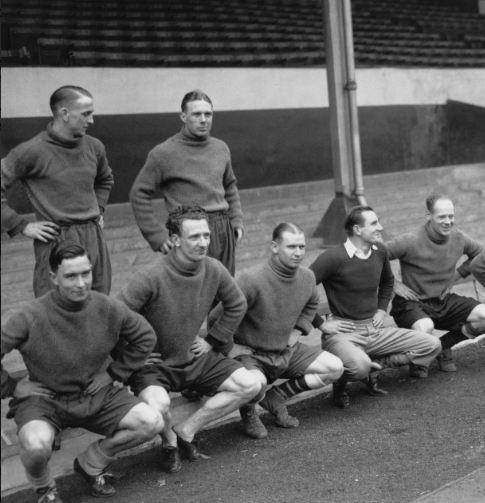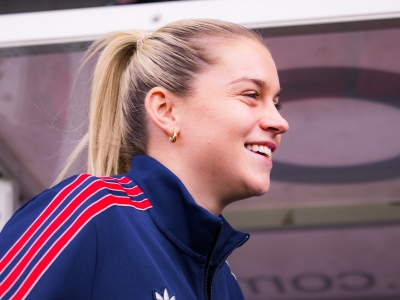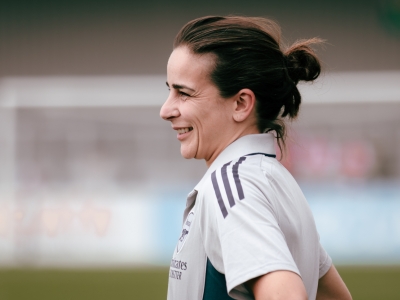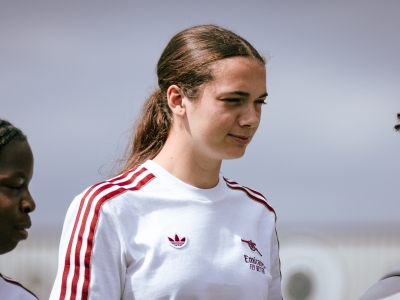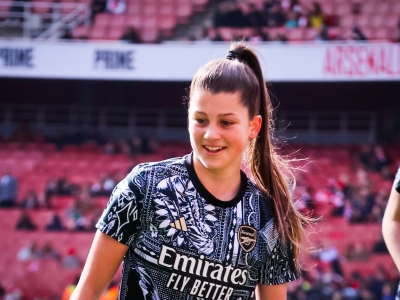February marks the 96th year since Arsenal great Herbie Roberts was born in Owestry.
Arsenal's great defender gave his all for the club during the decade when the Gunners ruled, before he then made the ultimate sacrifice during the Second World War.
Read David Fensome's latest column as he recalls the no-nonsense centre half.
....................
“Herbert Roberts, our tall centre half”, intoned Tom Whittaker, as the Pathé newsreel camera panned along the team, on a sunny day at Highbury, just prior to the 1932 FA Cup final.
A rousing, comradely version of Raymond Wallace’s 1931 hit, ‘Jolly Good Company’, was the finale to the film, sung by the team with Roberts, better known as Herbie, standing head and shoulders above his mates.
It was an apt choice of song, for under Chapman and Whittaker’s leadership much store was put by the happy family atmosphere which was, by then, wrapped around, and enveloping the environs of N5. Shakespeare’s words, delivered through the character of John of Gaunt in Richard II, ‘this happy breed of men’ describes Arsenal in the thirties just as successfully as it captures Gaunt’s dreams of a lost England under his monarch’s despotic reign; for Highbury was always, ‘this blessed plot, this earth, this realm’; and Arsenal indeed were so very ‘famous by their birth’.
Herbie Roberts, the definitive ‘policeman-stopper’, was central to that team, a foundation of its success; and, perhaps single-handedly, responsible for establishing a tradition of, and reputation for, central defenders of resilience, endeavour, and fortitude: he set a benchmark that only the very best have managed to aspire to, even in the often trophy laden years which have followed him.
He was a quietly spoken, modest, and gentle man, whose nature bellied his straight forward and no-nonsense efficiency on the pitch.
The no-nonsense Welshman
A native of Oswestry, he arrived at Highbury from his home town club for £200 in December 1926, at the age of 21. He began life as a right half-back, flitting in and out of the team, but once Chapman had decided upon his new backline of three defenders (as he switched to his famous W-M formation) Roberts quickly became the obvious choice, the most natural incumbent of that new pivotal position in Arsenal’s game plan.
Contemporary newspaper reports of Arsenal goals so often began with a description of Roberts winning the ball back and with a quick pass out of defence setting in train the move towards another goal for the Arsenal.
He contributed the odd goal too, one crucial effort being a goal he scored earlier in the run towards that 1932 Wembley appearance. A tricky quarter-final tie was navigated away at Huddersfield, courtesy of a second minute towering header from Roberts: the only goal in a reassuringly familiar score line of 1-0 to the Arsenal.
Herbie, though standing well over 6 feet tall, weighed a mere 12 stone for much of his career, as far from the idea of the big, brick wall centre-back I grew up with as you can get. His slight build though assisted his mobility, quick to change direction and fleet of foot with insight and ability to read the game, I often imagine him as a prototype David O’Leary, which is a comparison which glorifies both men equally in my view!
Tom Whittaker’s view was more down to earth! He said, “Herbie’s genius came from his intelligence, and even more important, that he did as he was told.
His orders were to stay in the centre, intercept balls down the middle and head them clear, or pass them short”. Roberts admitted himself that he wasn’t a player without weaknesses, acknowledging that he could neither kick a ball hard, nor very far! His rigid adherence to his manager’s orders helped camouflage any short comings he might well have had.
It was a change in the offside law which helped precipitate Arsenal’s adoption of the deeper lying centre-back in a three man backline, though just as compelling a reason was a resounding 7-0 defeat at Newcastle and Charlie Buchan’s response to it – an equally resounding threat to quit at the end of the season if Chapman didn’t enact some change to shore up the defence. Although other teams picked up and adopted the W-M formation, which Chapman’s Arsenal made famous, it was at Highbury that the preeminent exemplars of the system were to be found, and Arsenal became the club most readily associated with it.
The Gunner’s response, to that change in offside, of redeploying an extra defender, on its own might not have been sufficient, but as soon as Roberts had been converted into a man-marking central defender, positioned between the two full-backs then the system was largely complete; and the switch quickly augmented the rapid gains Arsenal were now making under Chapman: the success that that system was accorded is now largely acknowledged as being down to Roberts in no small measure.
For not only did Roberts prove outstanding in this role, he is largely acknowledged around the football world, still to this day, as being the archetype from whom all central defenders thereafter emerged.
By today’s standards he was two players in one: the ball winning stopper and the ball playing sweeper rolled into one; in time Roberts’ role would indeed require two men to satisfactorily fulfil its function: think Tony Adams combined with O’Leary and you have the idea! The change in the laws helped cement Roberts place in the team and it is strange to think that without it he might have gone through his career without ever really making a mark.
With Roberts on board Arsenal soon embarked upon their famous jolly spree, like Raffles collecting silverware! With Arsenal, Herbie collected four league title medals (including of course the hat-trick of 1933/34/35); and an FA Cup winner’s medal in 1936.
He came close to a fifth league title medal, falling one game short of the number required for a medal in 1937/38, the season when the big man’s career was cut down suddenly with a terrible knee injury, followed by a blood clot complication up at Ayresome Park in early winter: he never played again.
Man of honour, man of duty
Following his retirement from playing he was retained by the club and he trained the Southern League XI until the Second World War broke out.
Ever the man of duty, Roberts joined the Royal Fusiliers, serving as a Lieutenant until he joined the long list of Arsenal footballers who have died in the service of their country with his own death in 1944 from erysipelas at the early age of 39.
There is an old, out of print book about Herbie, entitled The Prince of Stoppers, an appropriate title it seems for he was never the King, Kaiser, or Emperor neither by style nor temperament, but he was always there just out of the limelight, doing his job simply and supremely effectively: for proof just look at his medals!
When I used to go to Highbury, in a quiet moment as the twilight rolled up and over those magnificent stands East and West, I used to ty to imagine and picture so many ghosts of men like Roberts, as they moved across that once bejewelled meadow; when I saw that old palace as it used to be and caught the distant murmurs of the past: now I can’t even imagine Herbie Roberts in colour: for he is forever caught in sepia, and, black and white, or the odd flickering film; but there he is smiling back across the years, waving his fist and singing: “la-de-dah-de-dah, la-de-dah-de-de, all good chums, and jolly good company!” Herbie, like so many, must never be forgotten.
..........
..........

